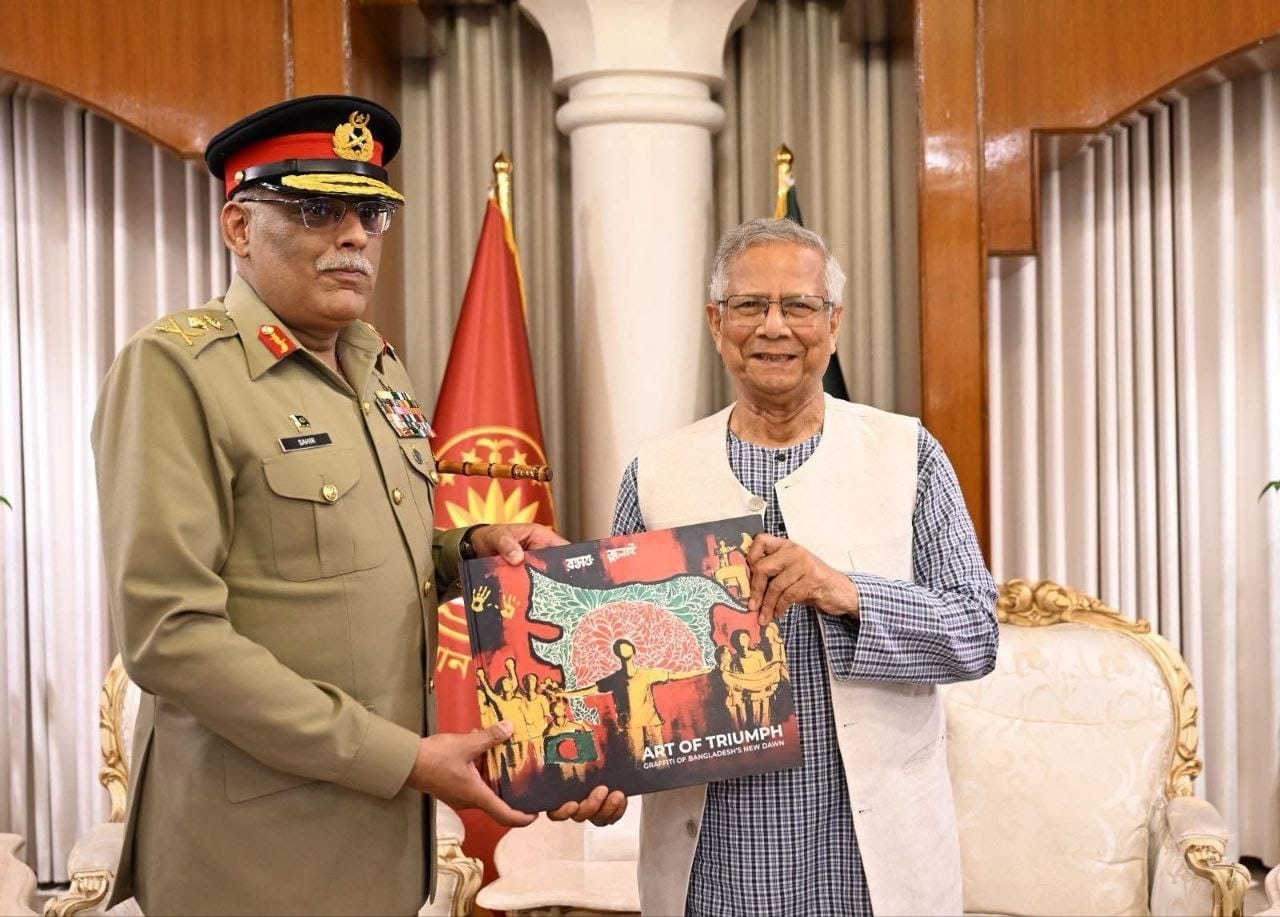India’s Eastern Theatre: A Brewing Dilemma & Pak Bangla Rapprochement
Yunus gifting Pak general a distorted map showing India's Northeast in Bangladesh
The Eastern Theatre along the Indo-Bangladesh border had mostly remained more or less a concern only with respect to insurgency and demographic incursion. Till the Awami League was at the helm of affairs in Bangladesh, the Indian security establishment had remained somewhat unbothered. As experts believed there was never a real threat from the eastern sector, at least militarily. There was, and still is, a consensus among experts of Bangladesh that the brewing instability in Bangladesh at present is temporary and post the general elections scheduled for February 2026, things will get normalised.
While most experts believe, the silent electorate that had elected Sheikh Hasina would bet their cards on BNP and together with the already existing loyalist electorate of BNP, may give the party a landslide victory. On the other hand, the Jamaat is betting its cards on polarising the Islamist electorate and has conveniently found ISCKON as the worthy enemy to rally as a common threat to propagate its agenda politically.
However, the Jamaat, apart from Politically, had been able to achieve something deadlier and consequential. For more than a decade now, the Jamaat has been able to infiltrate the lower ranks of the Bangladesh Army and Paramilitary. While the top brass of the BD Army remains mostly rational in its approach to dealings with India in the contemporary scenario.
Nevertheless, the BD Army does not always function in a pyramidical top-down approach, in contrast to what is mostly believed or as it is mostly perceived by civilian observers in India.
While the COAS of BD Army, in this case, Gen Zaman, sits and heads the Army HQ, there is another structure i,e is the Armed forces division or the AFD as it is referred to, which enjoys influential position being manned by the Tri Services Joint staff stationed at the PMO directly under the command of PM or Chief Adviser Yonus in this case. Thus, providing a critical strong hand in enforcing policy decisions, Planning and Implementation, Operations and inter-service Coordination.
The Pro Rational elements within the BD Army face a two-front challenge, one from the increasingly radicalised lower ranks that is outrightly anti-India and conserves a softer stance towards Pakistan, and second, the top anti-India civilian administration with the AFD at its hand, that outrightly rejects any rational, even at the cost of its socio-economic wellbeing.
Furthermore, the recent coercive tactics reportedly unleashed targeting more than 100 officers of the BD Armed forces, including those from the Director General of Forces Intelligence, clearly justify the previous observation on the two-front challenges coercing the rational lobby of the BD Army into submission.
Although the Pakistani establishment started warming up to its Bangladeshi counterparts immediately after the undemocratic removal of PM Sheikh Hasina. However, it is incontrovertibly evident, based on the recent developments, post Operation Sindoor, that the new equation between Pakistan and Bangladesh has received significant fuel from the US, which is rewriting its policy on Asian interests.
What had irked the US and brought it closer to Pakistan is now well established and doesn’t need to be briefed further in this article. However, what the US has realised and is putting into practice post Operation Sindoor holds a significant challenge to the Indian political and security establishment. The US has understood that it not only needs to checkmate China but also needs to keep India on its toes, and the last decade of peace on India’s Eastern front has not served for its nefarious incantations for Asia. The US has realised that Pakistan is a weakling that it can arm-twist and dictate terms without consequences, while India, with its vibrant democracy, resilient economy and professional Armed forces, cannot be coerced away from its commitment to preserving strategic autonomy.
Therefore, after taking control of the St Martin's Island of Bangladesh with a proximity of only 40 km from the nearest Indian territory, and gaining an unprecedented snooping edge not only over China but also over India. The US has decided to up its ante against India in a way that doesn’t stain American hands, and at the same time teaches India a lesson for submitting to its Asian dreams. Pakistan’s utility in destabilising the eastern sector of India while keeping its muddy hands clean is perfectly poised for the American playbook, while being mutually beneficial for both America and Pakistan.
Subsequently, Pakistan, with dough from the Americans and NATO to an extent, had found itself to have arrived at an unprecedented prospect to settle old scores with India and to toil for a century-old dream of an Islamic dominion, carved out from the Eastern theatre of India, namely, from the states of Assam and West Bengal. Bangladesh serves as the perfect launching ground for the dreams of both America and of Islamic Pakistan, as far as disturbing India’s eastern theatre is concerned.
What bolsters Pakistani dreams for the eastern theatre of India is the presence of a very strong politically significant fifth column in these states, especially in West Bengal, Assam and to an extent, Tripura. While Assam and Tripura are currently under the rule of a Nationalist party, West Bengal, on the other hand, is in complete turmoil, overrun by the fifth column that has not only infiltrated the polity but also has successfully infiltrated the civil administration and state police ranks and files.
At the same time, the Jamaat of Bangladesh, which was proscribed and subsequently regained its prior status post-protests, maintains a strategic coordination with Pakistani agencies and, interestingly, has received significant audience from policy makers of the European Union. If chatters in the power corridors of Bangladesh are to be believed, America & EU -NATO lobby is going to pour millions into the Bangladesh General election, with both BNP and Jamaat at its receiving end, with a lot of betting on BNP forming the government and Jamaat securing the role of Opposition.
In any scenario, India can and should reach out to the BNP and try to polish the rough edges, though it doesn’t guarantee Indian interests, but at least it can keep back doors open for negotiations at a suitable time.
While Jamaat, till a few months ago, was sending its preachers to Assam (stopped after Assam Police Crackdown) and is still exporting them into West Bengal. It is widely believed that Jamaat and similar Bangladeshi entities have built an extensive, well-knit human network through mushrooming religious structures along the Indo-Bangla border, reportedly possessing the influence to mobilise and kill mobility of Indian forces at a critical juncture, when the need arises.
At this juncture, a military confrontation at the eastern theatre, especially along the Indo-Bangla border, seems far-fetched, but eventually India will face a 3.5 front war for which, as early as the Nation Society anticipates and positions itself, the better chance it will have at surviving the inevitable.
https://www.globalgovernancenews.com/home-ministry-directs-border-states-to-demolish-border-constructs/
While this article only navigates the challenges at the eastern theatre with respect to the Indo-Bangla border, it is unreasonable to assume that this is the only challenge to India’s eastern theatre. With Manipur still far from achieving peace, and foreign hands evidently at play, newer fronts like Arunachal Pradesh, with entities such as the United Tai Army, are emerging alongside conventional insurgents. It's best to anticipate the worst in the days to come and reinvent the civil-military ecosystem in a more robust way capable of handling challenges at the intensity unexpected by our adversaries.



